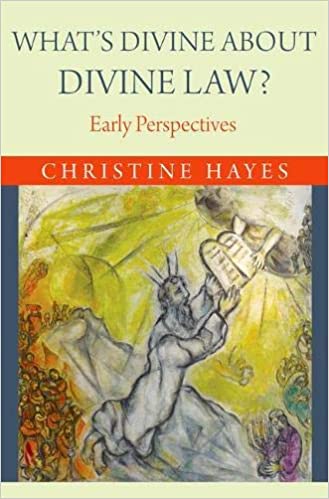Description
How ancient thinkers grappled with competing conceptions of divine law
In the thousand years before the rise of Islam, two radically diverse conceptions of what it means to say that a law is divine confronted one another with a force that reverberates to the present. What’s Divine about Divine Law? untangles the classical and biblical roots of the Western idea of divine law and shows how early adherents to biblical tradition―Hellenistic Jewish writers such as Philo, the community at Qumran, Paul, and the talmudic rabbis―struggled to make sense of this conflicting legacy.
Christine Hayes shows that for the ancient Greeks, divine law was divine by virtue of its inherent qualities of intrinsic rationality, truth, universality, and immutability, while for the biblical authors, divine law was divine because it was grounded in revelation with no presumption of rationality, conformity to truth, universality, or immutability. Hayes describes the collision of these opposing conceptions in the Hellenistic period, and details competing attempts to resolve the resulting cognitive dissonance. She shows how Second Temple and Hellenistic Jewish writers, from the author of 1 Enoch to Philo of Alexandria, were engaged in a common project of bridging the gulf between classical and biblical notions of divine law, while Paul, in his letters to the early Christian church, sought to widen it. Hayes then delves into the literature of classical rabbinic Judaism to reveal how the talmudic rabbis took a third and scandalous path, insisting on a construction of divine law intentionally at odds with the Greco-Roman and Pauline conceptions that would come to dominate the Christianized West.
A stunning achievement in intellectual history, What’s Divine about Divine Law? sheds critical light on an ancient debate that would shape foundational Western thought, and that continues to inform contemporary views about the nature and purpose of law and the nature and authority of Scripture.
Reviews
“Hayes invites us to consider how the early rabbinic conception of divine law continues to echo in modern debates within Judaism. Her remarkable book should be required reading for anyone concerned about the future of Judaism and, indeed, the future of law”
—Suzanne L. Stone, Yeshiva University
“This book is beautifully written, carefully structured and as such represents a wonderfully clear way in to the bewildering world of rabbinic Judaism as well as shedding new light on some of the ongoing debates in both Jewish and legal studies.”
—Joshua M. Heyes, Theology“Christine Hayes has both enriched and challenged the scholarly community with a thoroughly explorative, ambitious, and erudite study of the modalities of Jewish law in relation to Graeco-Roman law theory”
—Peter J. Tomson, Journal for the Study of Judaism
